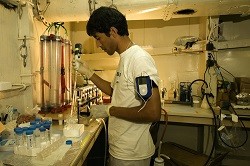Culturing the uncultured marine microorganisms with innovative biotechnology
European societies face global challenges from climate change, increasing CO2 levels, to energy and food crises that increasingly affect our everyday life. 70 % of our planet is covered in an ocean full of unlimited and hidden diverse microbes. These microorganisms provide food for higher organisms such as fish and are also responsible for the ‘carbon pump’ which counteracts the increase of CO2 levels and global warming. With 99.9% of the total number of species remaining unknown and 90 % of oceanic biomass being microscopic, it is crucial that we start to understand how these processes work in the microbiome. Within this context, MACUMBA’s (Marine microorganisms: Cultivation methods for improving their biotechnological applications) core mission has been to develop innovative techniques to isolate and culture the various marine microbial microorganisms - bacteria, archaea, and eukarya. ‘There has been little attention in microbiological education in isolating and culturing microorganisms and MACUMBA was among other things designed to revive these skills and the importance of keeping microorganisms in culture collections and biological resources for society,’ shares MACUMBA project coordinator Professor Lucas Stal. Using biotechnology to overcome culture changes Being able to determine, mimic and sample the natural conditions of hidden and hitherto unknown microorganisms was a major challenge. The sea is not homogenous and entails many different environments. To meet these challenges, MACUMBA decided to culture microorganisms as both pure and co-cultivation to find clues for new microorganisms, compounds and traits. In the past it was thought that microorganisms could be best understood as pure cultures by analysing nucleic acids (DNA and RNA). However this thinking has now shifted as microorganisms do not live alone in nature but rather provide each other with essential growth factors. As a result, MACUMBA used a whole range of innovative techniques on marine microbiome. Optical tweezers were developed for the isolation of single cells out of a mixture of single cells as was a “Survival Box” for collecting cyanobacteria to monitor their overall growth conditions, resilience and reaction to external cultivation strategies. ‘We extracted DNA and RNA from isolated microorganisms and analysed their genome and transcriptome in order to find clues for specific traits. We also extracted DNA and RNA from co-cultures and compared these with the pure cultures to get a clue of the interactions,’ underlines Professor Lucas Stal. Preservation of these isolated organisms proved to be another major challenge and the team made up of 22 partners from 12 EU countries focused on cryo-preservation in the form of liquid nitrogen vapour (-196oC), using various cryo-preservants (such DMSO, glycerol, methanol, and others) and various freezing protocols. Moving forward from MACUMBA The project officially ended in July 2016 with project partners uncovering thousands of biodiverse microorganisms such as the world’s smallest aquatic bacterium and new culture methods and collections all over Europe. Finding novel species and unravelling the mysteries of the ocean remains a huge challenge. Many more years of similar collaboration will be necessary to unlock the full potential of marine microbes as marketable products. Nevertheless, Professor Lucas Stal who is retiring, believes that this marks the beginning of new era. MACUMBA’s methods and techniques certainly now represent a significant first step towards making similar future wide-ranging research approaches that will sooner rather than later lead to pharmacological and biotechnological products.
Keywords
MACUMBA, health, marine biology, environment, society

